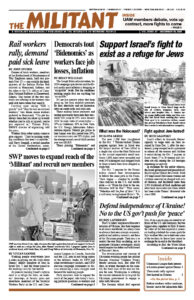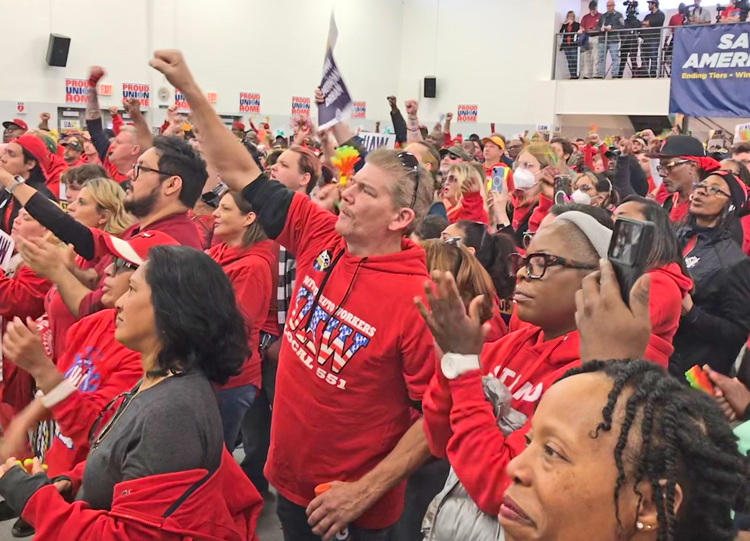The United Auto Workers announced Nov. 20 that its members at Ford, General Motors and Stellantis had voted up new contracts after strikes at the Big Three’s assembly plants, parts production sites and distribution centers. They cover over 146,000 autoworkers.
The fight was watched closely by millions of workers who also face falling real wages and worsening conditions from past concessions to the bosses and today’s deepening capitalist crisis.
There is no question workers won some important gains. And most came away feeling the union was stronger, better prepared to fight.
The UAW’s selective strikes, involving from 13,000 to 50,000 workers, took place over six weeks. The union demanded a 40% wage increase, an end to the hated two-tier wage and benefit system, return of a cost-of-living clause so wages match inflation, making all temporary workers permanent, reinstatement of pensions and health care for workers hired since 2007 and other measures. The strike was popular, both among autoworkers and other unionists.
Many of the demands aimed to make up for deep concessions the union made from 2007. The Big Three bosses said the deep unfolding financial crisis threatened them with bankruptcy. The government agreed to step in, but only if the union agreed to big cutbacks.
“Many of us were hired in right after the big concessions were put in place,” Trish Randolph, who works at the Ford Kentucky Truck Plant in Louisville, Kentucky, told the Militant Nov. 28. Workers there voted against the contract by 55%. “We came in at much lower wages and it took us eight or nine years to get to top pay. We’re really glad that the newer workers are getting a big jump in pay.”
There was a lot of discussion and debate over the tentative contract recommended by union officials. In a number of the big assembly plants members voted to reject it. Overall, the contract passed at all three companies.
A 25% wage increase was won in the four-and-one-half-year contract. Workers still start at lower rates, but the progression from starting rates to full pay is cut from eight to three years.
Some workers were angry the pay raise wasn’t higher at the beginning of the contract so it would compound more over its life. Workers at GM’s Fort Wayne Assembly plant in Indiana voted the contract down because they wanted bigger raises in the first two years, Rich LeTourneau, UAW Local 2209 shop chair, told the Detroit Free Press.
Matt Horner has worked there for 20 years and is at the top rate, but will see only $2.80 an hour added to his wages immediately. “Why do I have to wait another four years for any kind of raise that’s gonna benefit me and my family,” he said. He voted against the contract.
Fight for pensions for all
Retirees hired before 2007 still have pensions and will get an increase, the first raise in 15 years. But “the increase was only 9.4%, which barely covers inflation for the past two years,” Local 14 President Tony Totty at the Toledo Propulsions System plant in Ohio told the press.
The situation facing workers who got jobs after 2007 is far worse. “We don’t have pensions or health care when we retire,” Randolph said. These workers get an inferior 401(k) plan, as do all new hires. “Pensions and post-retirement health care were a huge topic,” newly elected President Katie Deatherage of Local 2250 at GM’s plant in Wentzville, Missouri, told the press. She said 70% to 75% of workers there were hired after 2007. Workers voted the contract down.
“Getting back cost-of-living adjustments is really important,” Randolph said. Workers’ wages at Ford will be adjusted every three months to incorporate any raise in the government’s consumer price index. “But we were hoping for more compensation across the board. I’m only getting $3.50-an-hour more.”
With the strike solid and more Big Three workers ready to join the selective strike action, some UAW members say it was possible to win more.
Autoworkers “lost everything in one contract,” Jerry Coleman told NPR. He works at the Stellantis Jeep plant in Toledo, Ohio, where a majority of workers voted no. “There’s no reason why they can’t afford to give this stuff back to us in one contract.”
The vote for the contract was 64% across the three companies. Thousands of workers didn’t vote. At Ford, 21,500 of the 57,000 UAW members chose not to cast a ballot. At GM, 10,000 of the 46,000 union members didn’t vote.
Bosses lost no time making clear they intend to try to take more out of workers now that the strike is over, with speedup and forced overtime. Workers will have to “work aggressive schedules,” GM boss Gerald Johnson threatened Nov. 20. “We are going to have to work very hard on productivity,” Ford CEO James Farley said the same day. Of course, there is no “we” on the assembly line.
One result of the strike is the decision of bosses at several nonunion auto plants to grant wage hikes, hoping to tamp down interest among workers there looking to fight for union recognition.
“Many of these plants are now giving workers big raises because of our fight,” Randolph said. Workers at Volkswagen in Chattanooga, Tennessee, got an 11% hike; workers at some Nissan plants, 10%. Wages at Hyundai will rise by 25% over four years. At Toyota the number of years it takes to reach top rate will drop from eight years to four.
Another gain won in the strike was bosses’ agreement that workers in some of the rapidly expanding electric-car battery plants can join the union.
These fights continue. Days after the UAW announced plans to organize unorganized plants, Tesla boss Elon Musk made clear he would fight back. “I disagree with the idea of unions,” he said.
Amy Husk in Louisville, Kentucky, contributed to this article.


